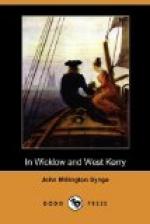‘A few years ago,’ he said, ’they were all for stopping it off; and when I was a boy they tied a gobban into my mouth for the whole afternoon because I was heard speaking Irish. Wasn’t that great cruelty? And now when I hear the same busybodies coming around and telling us for the love of God to speak nothing but Irish, I’ve a good mind to tell them to go to hell. There was a priest out here a while since who was telling us to stay always where we are, and to speak nothing but Irish; but, I suppose, although the priests are learned men, and great scholars, they don’t understand the life of the people the same as another man would. In this place the land is poor—you can see that for yourself—and the people have little else to live on; so that when there is a long family, one son will stay at home and keep on the farm, and the others will go away because they must go. Then when they once pass out of the Dingle station in Tralee they won’t hear a word of Irish, or meet anyone who’d understand it; so what good, I ask you, is a man who hasn’t got the English, and plenty of it?’
After I left him I went on towards Dunquin, and lay for a long time on the side of a magnificently wild road under Croagh Martin, where I could see the Blasket Islands and the end of Dunmore Head, the most westerly point of Europe. It was a grey day, with a curious silence on the sea and sky and no sign of life anywhere, except the sail of one curagh—or niavogue, as they are called here—that was sailing in from the islands. Now and then a cart passed me filled with old people and children, who saluted me in Irish; then I turned back myself. I got on a long road running through a bog, with a smooth mountain on one side and the sea on the other, and Brandon in front of me, partly covered with clouds. As far as I could see there were little groups of people on their way to the chapel in Ballyferriter, the men in homespun and the women wearing blue cloaks, or, more often, black shawls twisted over their heads. This procession along the olive bogs, between the mountains and the sea, on this grey day of autumn, seemed to wring me with the pang of emotion one meets everywhere in Ireland—an emotion that is partly local and patriotic, and partly a share of the desolation that is mixed everywhere with the supreme beauty of the world.
In the evening, when I was walking about the village, I fell in with a man who could read Gaelic, and was full of enthusiasm for the old language and of contempt for English.
‘I can tell you,’ he said, ’that the English I have is no more good to me than the cover of that pipe. Buyers come here from Dingle and Cork and Clare, and they have good Irish, and so has everyone we meet with, for there is no one can do business in this place who hasn’t the language on his tongue.’
Then I asked him about the young men who go away to America.




